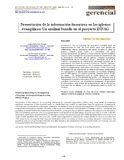Presentación de la información financiera en las iglesias evangélicas: Un análisis basado en el proyecto INPAG

Ver/
Fecha
2025-03-10Palabras Clave
Entidades sin fines de lucro, Estados financieros, Iglesias cristianas evangélicas, Normas contablesNot-for-profit entities, Financial statements, Evangelical Christian churches, Accounting standards
Metadatos
Mostrar el registro completo del ítemResumen
Introducción: Por la ausencia de normativa contable para las organizaciones sin fines de lucro (OSFL), estas han optado por implementar marcos normativos del sector lucrativo o crear sus propios criterios para suplir su necesidad de guía. Consecuentemente, las iglesias no están exentas de esta realidad. Objetivo: Esta investigación se propone analizar la presentación de
la información financiera de las iglesias cristianas evangélicas independientes de los municipios Sucre y Libertador de la Gran Caracas, considerando los lineamientos del primer borrador de la International Non-Profit Accounting Guidance (INPAG). Métodos: Esta investigación fue descriptiva, con un enfoque cuantitativo y de diseño no experimental, transversal y de campo. Como instrumento de recolección de información se utilizó la encuesta, distribuyendo un cuestionario a 12 iglesias seleccionadas. Los resultados reflejaron que el 100% registra sus cuentas nominales, mientras que el 41,66%, las reales. Se diagnosticó que el 6,66% aplica los criterios relacionados con la contabilidad de fondos y se demostró que el 75% elabora sus estados financieros (EEFF) conforme a alguna norma contable. Conclusiones: Los lineamientos empleados no garantizan la uniformidad y efectividad de la presentación de la información financiera de las iglesias, y no son apropiados para el sector no lucrativo
Colecciones
Información Adicional
| DOI | https://doi.org/10.53766/VIGEREN/2025.01.24.09 |
| Otros Títulos | Financial Reporting by Evangelical Churches: An Analysis Based on the INPAG Project |
| Correo Electrónico | angela.kelzi@correo.unimet.edu.ve csuescum@unimet.edu.ve |
| Editor | Saber-ULA |
| Resumen en otro Idioma | Introduction: In the absence of accounting standards for nonprofit organizations (NPOs), they have opted to implement regulatory frameworks of the for-profit sector or create their own criteria to meet their need for guidance. Consequently, churches are not exempt from this reality. Objective: This research aims to analyze the presentation of financial information of independent evangelical Christian churches in the Sucre and Libertador municipalities of Greater Caracas, considering the guidelines of the first draft of the International Non-Profit Accounting Guidance (INPAG). Methods: This research was descriptive, with a quantitative approach and a non-experimental, cross-sectional and field design. A survey was used as a data collection instrument, distributing a questionnaire to 12 selected churches. The results showed that 100% registered their nominal accounts, while 41.66% registered their real accounts. 6.66% were diagnosed as applying the criteria related to fund accounting and 75% were shown to prepare their financial statements (EEFF) according to some accounting standard. Conclusions: The guidelines used do not guarantee uniformity and effectiveness in the presentation of financial information of churches, and are not appropriate for the nonprofit sector |
| Colación | 143-159 |
| País | Venezuela |
| Institución | Universidad de Los Andes |





